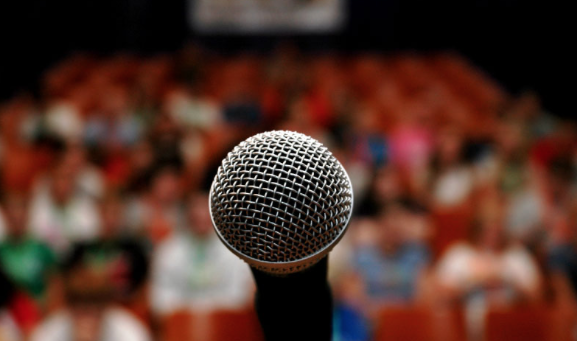My Electric Speechwriter, and Me
August 17, 2023
A new AI program just for writing speeches: It simulates the worst imaginable speechwriter, working for the jerkiest conceivable client. (In this case, me.)
Prologue, Post-Dated, August 24, 2023
I wrote the piece below before I spoke with the Dutch founders of the speechwriting app Verble, Devin van den Berg and Victor Straatman. In a happy half hour’s chat, I learned that van den Berg, an accomplished debater and debate and speaking coach, and Straatman, a once-frustrated presenter himself, are friendly, super thoughtful guys with good intentions.
All the objections that I threw at them to AI speech composition, they had thought of before.
They do not disrespect professional speechwriters, or the essential usefulness of having a speechwriter to “spar with,” as van den Berg put it. They just want to make an AI version of a solid speech composition process available to many more people than can afford the help of a communication coach.
Nor do they think their program spits out speeches that are anything like perfect. They think the questions their program forces the speaker to answer, about the purpose, the message and the audience for the speech, are as important as the output. And they agree that the output needs to be heavily edited by the speaker to truly sound of the speaker and for the audience. (Though I pointed out that this caveat might be made more explicit by the interface.)
Perhaps most compelling was Straatman’s personal testimony, about facing big presentations and staring at a blank screen, not knowing where to begin. He knew that as soon as he got something on that blank screen after an interminable period of staring at it, the thing started flowing. He believes Verble will help people like him get off that blank screen, and get their own thoughts flowing. Again, such humility isn’t shown on the site, which claims Verble is nothing short of “your professional speechwriter and public speaking coach, all in one.”
But these are good guys, not tech bros. They asked me lots of questions about speechwriters, and the speechwriting community. They’d be comfortable at a speechwriters’ conference and speechwriters would be comfortable with them.
And in the immediate wake of our call, Devin wrote:
Just read the piece you wrote and have to say that based on the Verble you got I can only agree with your findings. I actually like that you incorporated the screenshots because it clearly shows that you did not receive content related questions during the chat phase and it was not yet able to use the right tone and approach for this specific situation. As you might now know Verble is really in its early stage and there is much to improve so getting it out there and getting feedback is exactly what we need. So no worries.
We promised to keep in touch in case professional speechwriters and executive communication pros find a reason to collaborate with generative AI—or vice versa. We could find much worse people to work with.
—DM
•••
Hey, there’s a new ChatGPT-type tool, just for speechwriting. It’s called Verble and it’s described as “your AI speechwriting assistant.”
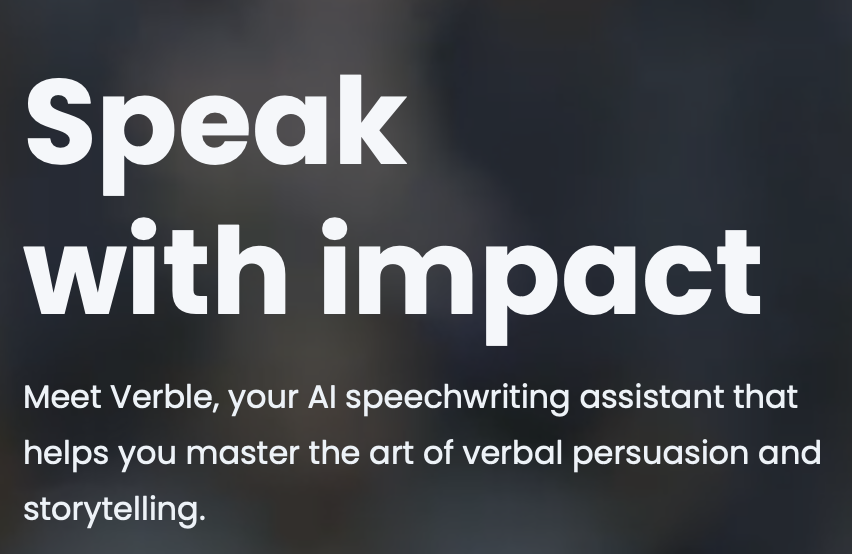
I thought I’d check to see if it could become my AI speechwriting assistant. I had a pretty urgent job for it, actually. My company has our annual offsite meeting next week, where we plan the whole year. I have a big idea that could be a hard sell to my crew, and I thought I’d put Verble to work.
All of the below took 15 minutes—the vast majority of that time spent being my own, typing into the prompts. The first blue prompt below, complete with typo, the program actually typed in for me.
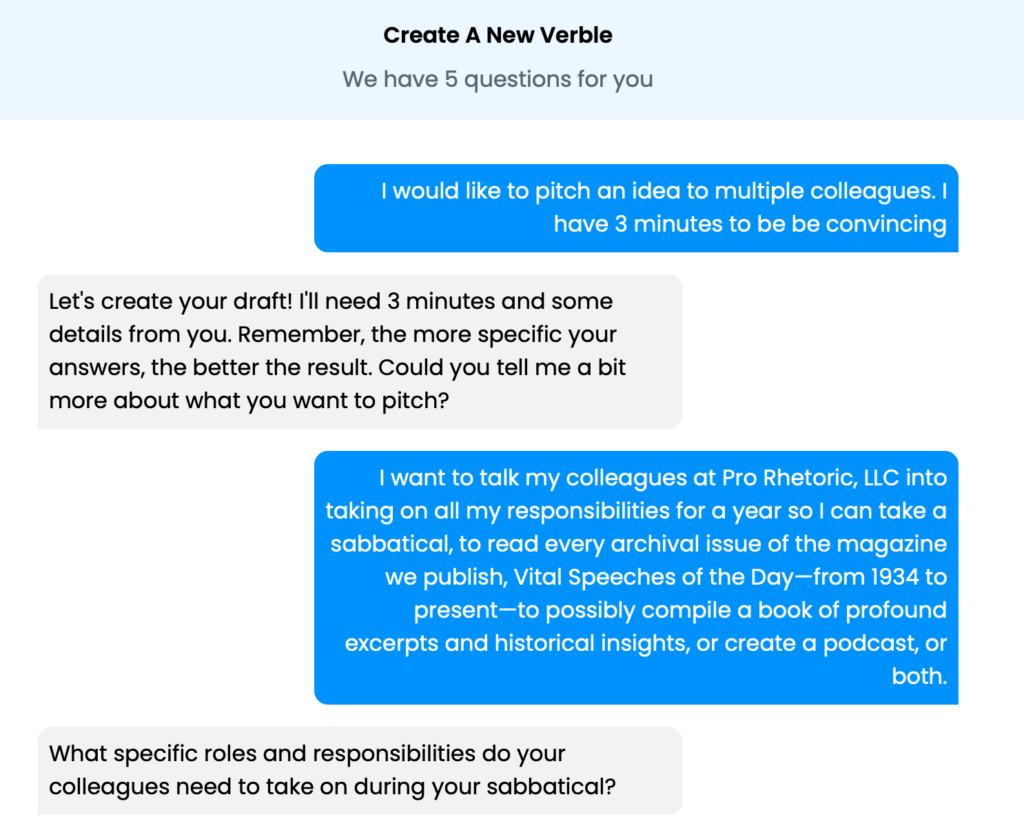
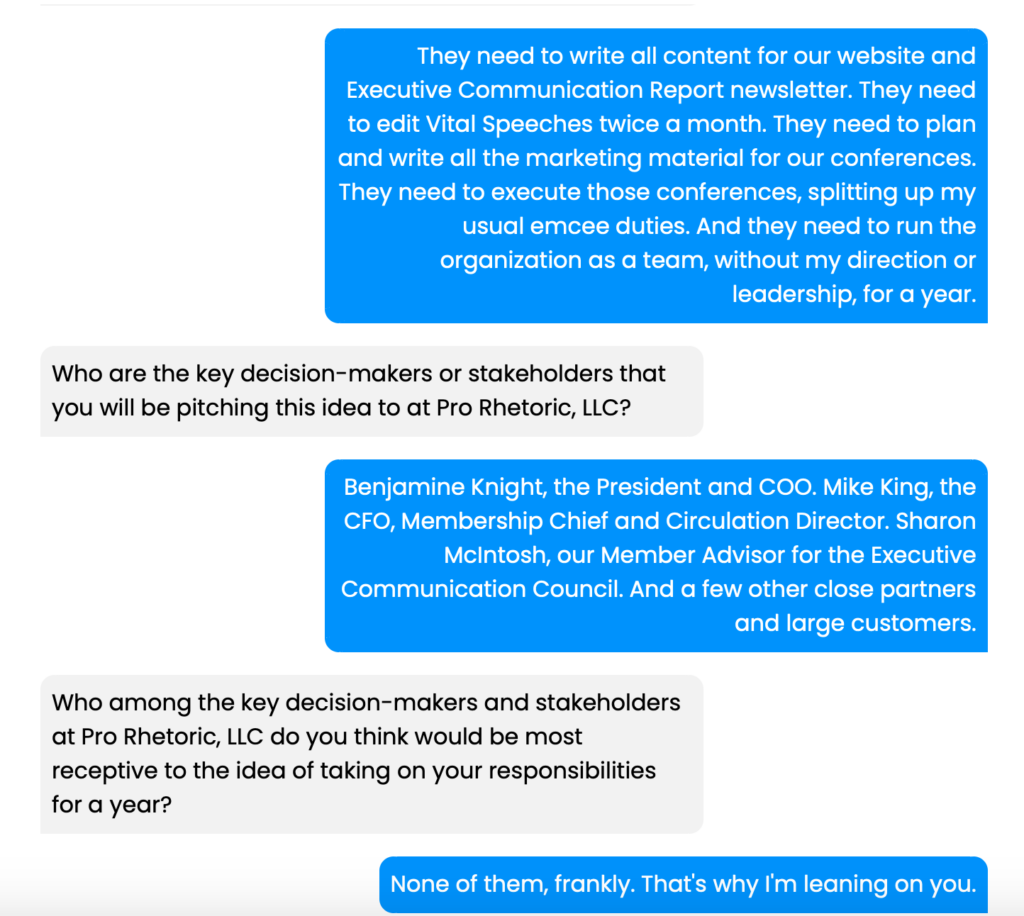
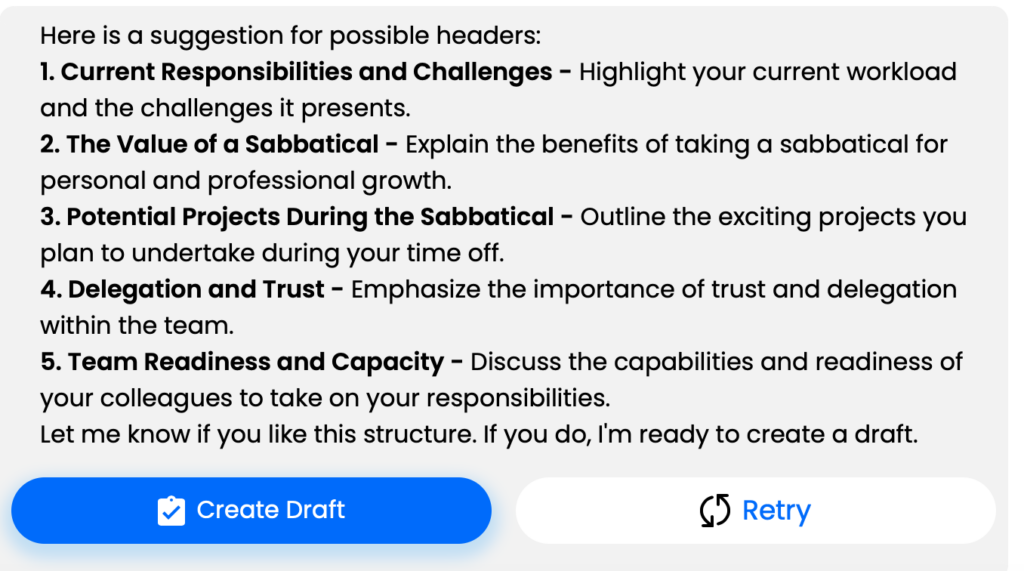
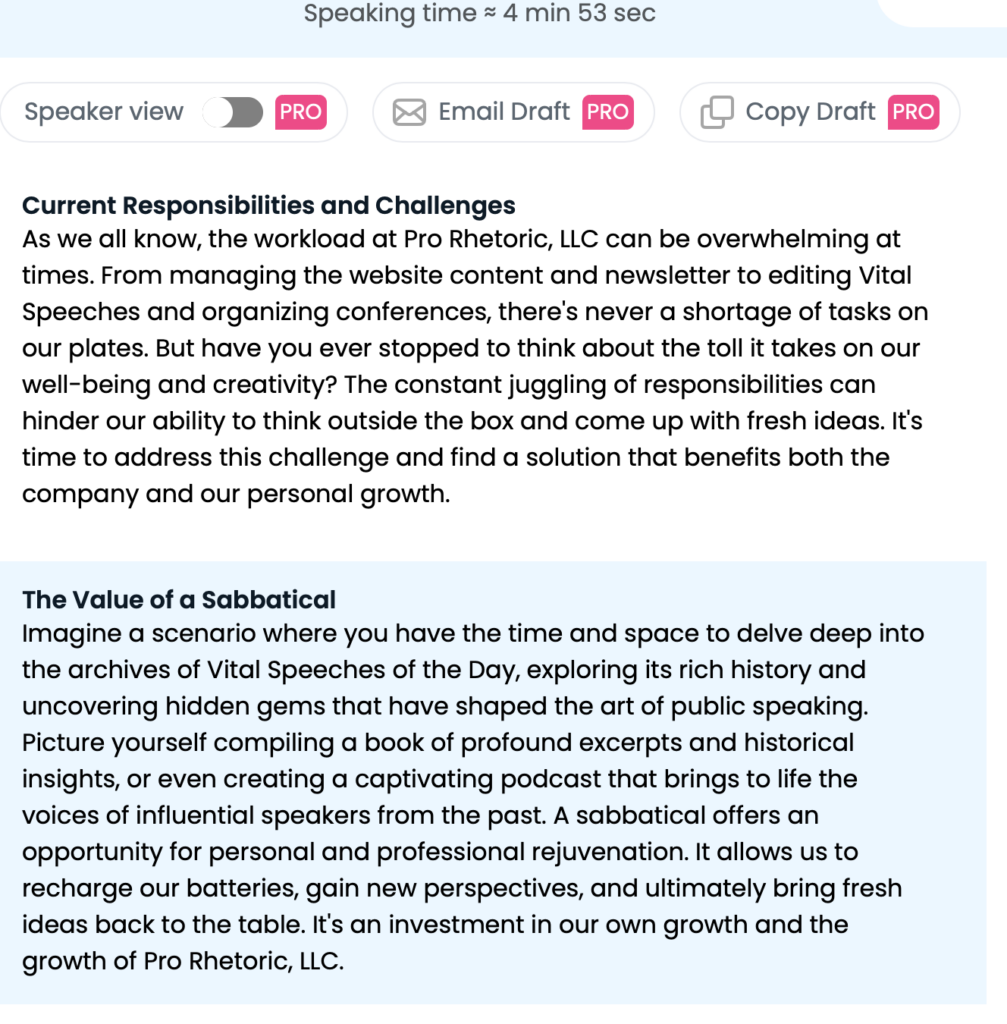
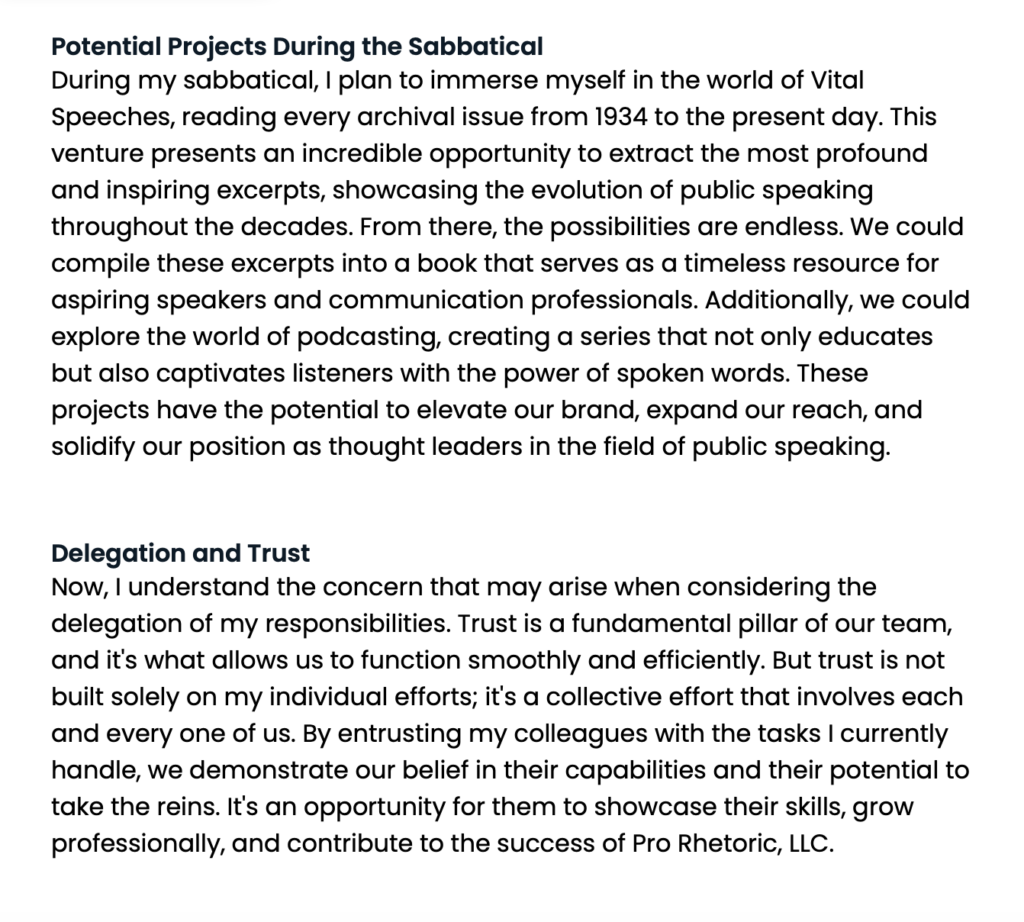
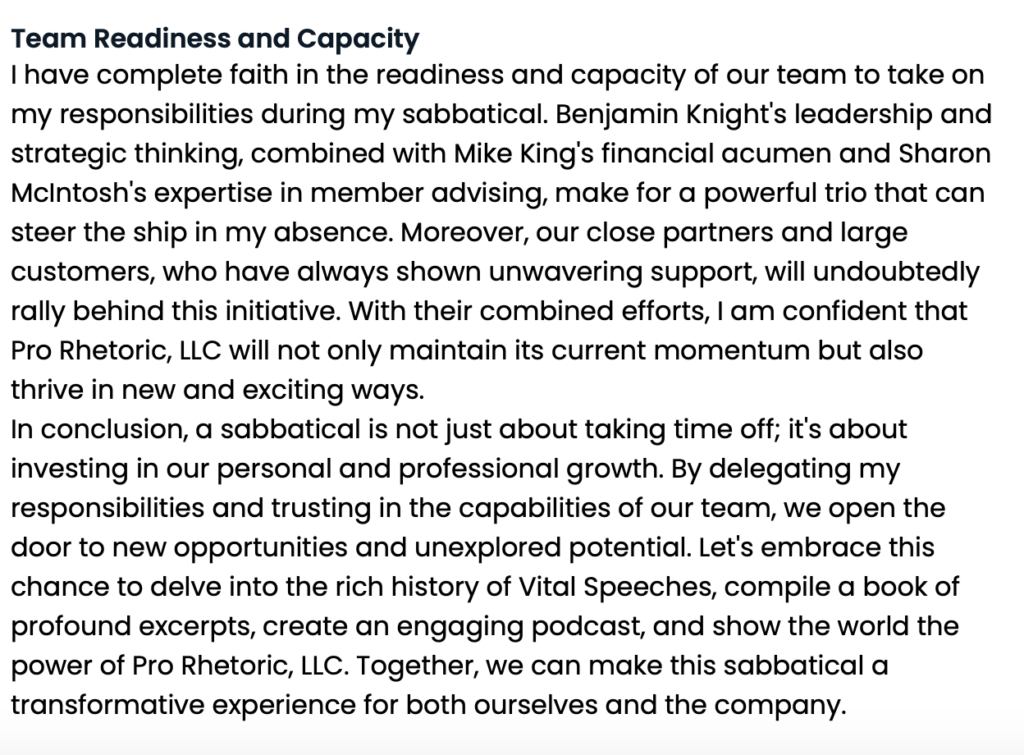
Well, whaddya think, gang? Far as I can tell, this AI assistant took on an ill-conceived assignment without any pushback, even though I said that not a single person on my team would be in favor of the idea.
Armed with that audience analysis, the program did a worse job of making the case than I did in my original query, introducing clichés like “outside the box” and “the possibilities are endless,” creating condescending and insulting bromides about how “trust is a fundamental pillar of our team” in the service of a disingenuous and utterly unconvincing argument that tries to gaslight my colleagues into believing if they don’t support my taking this self-indulgent sabbatical, they’re being selfish.
I am sure that AI will have an impact on speechwriting jobs someday, and I believe there are some legitimate uses today, especially for speechwriters researching unfamiliar subjects. In fact, we’ve got a session on the subject at the PSA World Conference this October … and another at our Speechwriting School.
But if, as a speechwriter or a communicator of any kind, you are afraid of being put out of work by the conception and composition abilities of a tool like this, then you should be. Because you weren’t a speechwriter in the first place, you were a typist.
And if, as a leader, you find this speechwriting assistant is a worthy substitute for a real communication pro, then you’ve either employed very bad comms people or you’re unworthy of a good one.
As for most speechwriters I know and respect, I lean on the incredulity of one of them, faced with the notion that AI could replace him: “Do they have any idea what I actually do around here?”
_______
Cover cartoon is a “Deep Doodle“ by Larry Crittendon.


